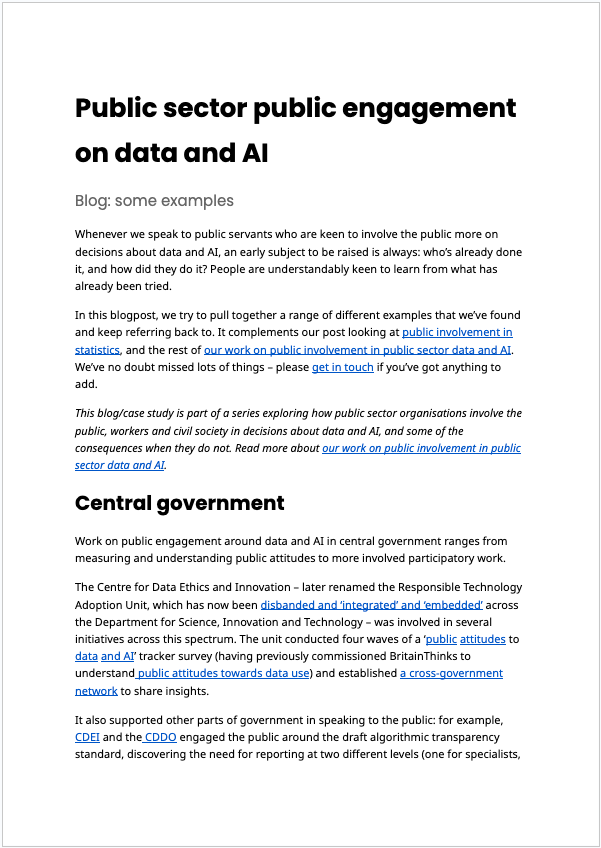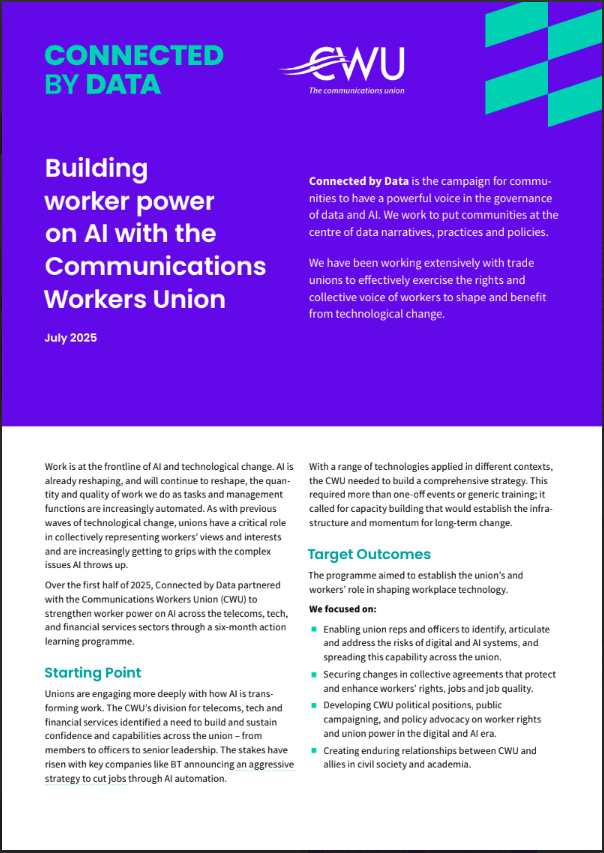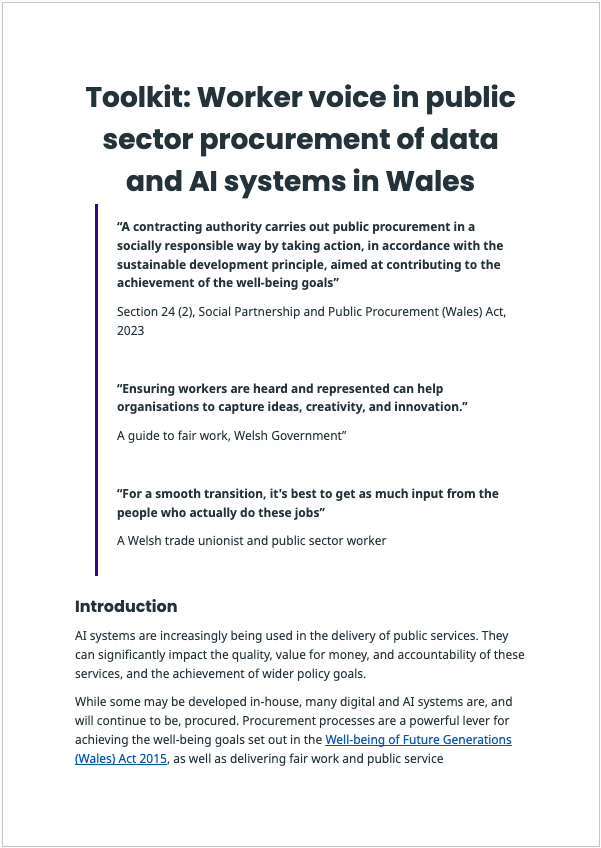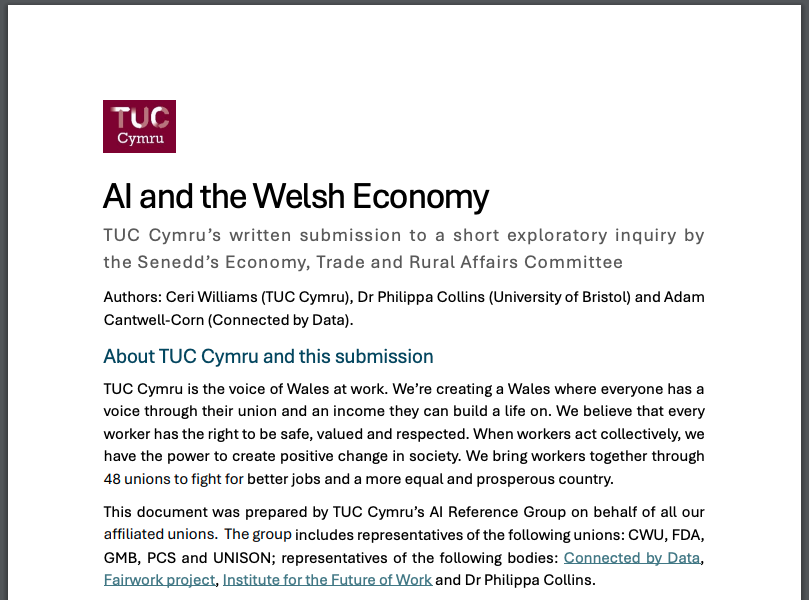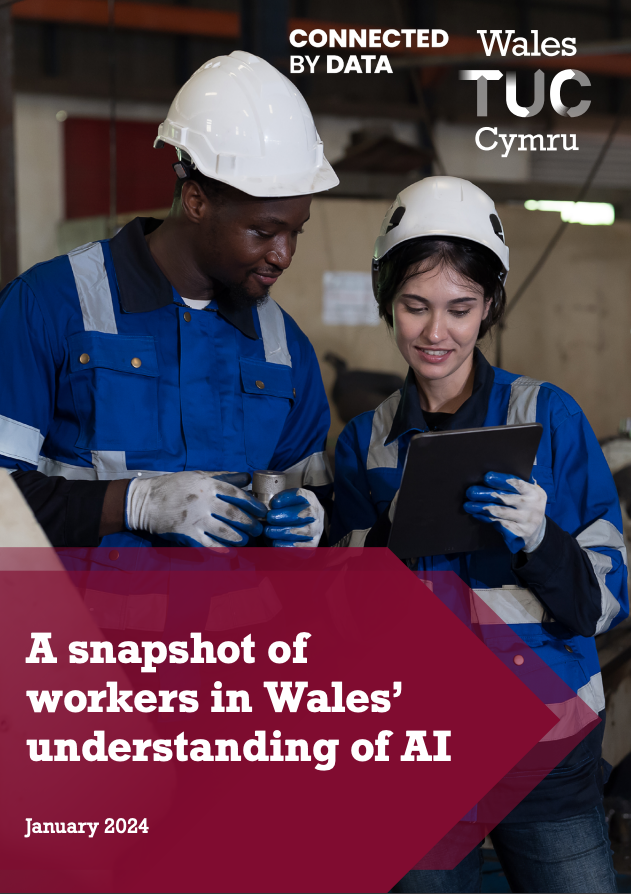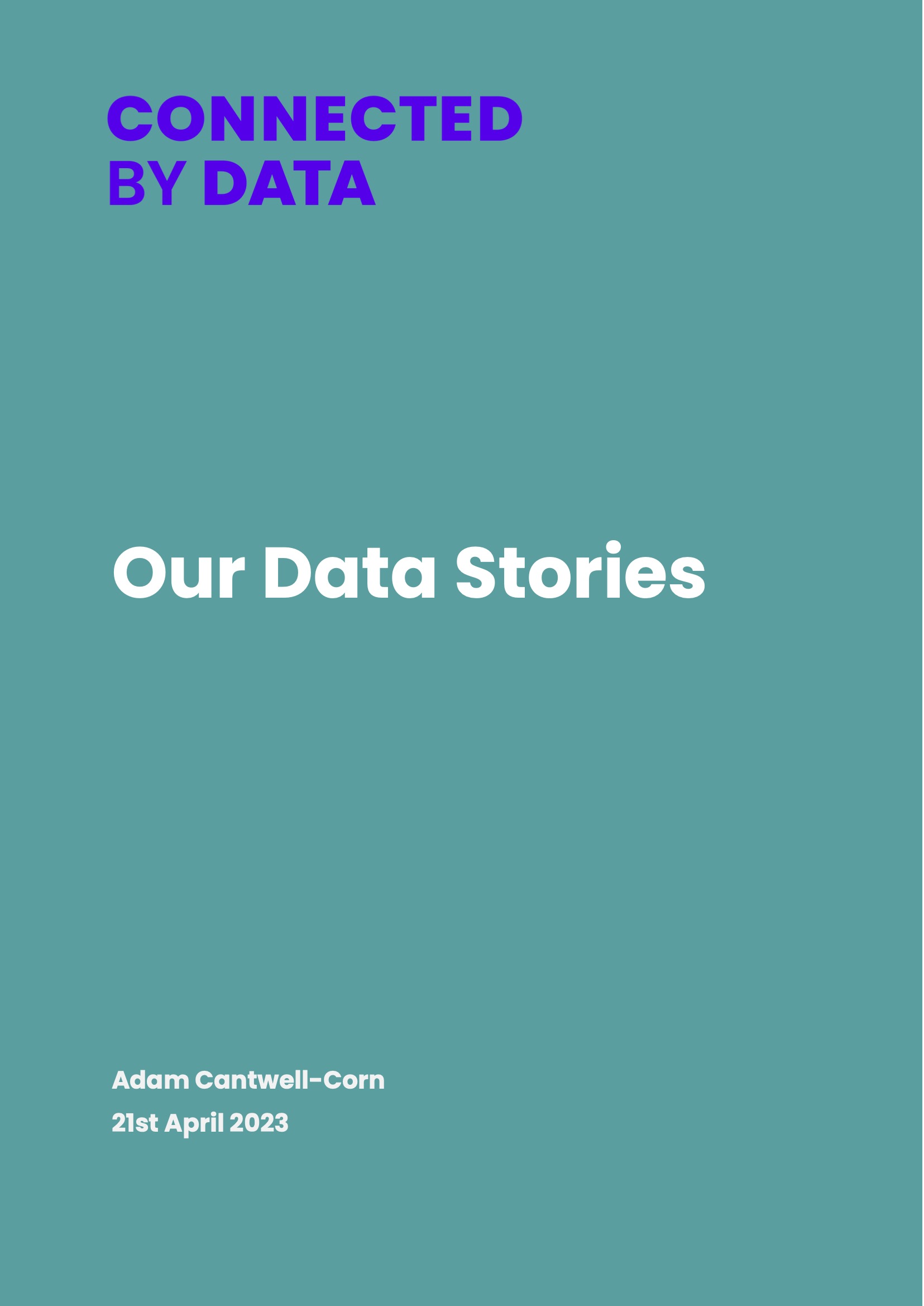Work
Giving workers a powerful say


The most essential purpose of work is the means to sustain ourselves. At its best, work can help us find meaning, community and dignity. With so much at stake, how data and AI technologies may affect work is an important concern for millions.
A key strategic focus for Connected by Data has been on how to build worker power on data and AI so that the rules, choices and processes of technology protect and enhance our livelihoods and wellbeing day in and day out.
Through a series of projects and events, we’re working in collaboration with workers and unions, from picket lines to Parliament, to amplify voices, create policy and develop strategies to take the initiative on data and AI across the world of work, including in the civil service, education and logistics.
A joint statement made by 10 unions representing education workers, produced as part of the Connected by Data and TUC project ‘Building educator’s power to shape AI‘
We are ten unions representing millions of educators across the UK – teachers, specialists, support staff, school leaders, and workers throughout the education system. Every day we support, teach and lead in schools, colleges, and universities across all jurisdictions of the UK.
As AI is being rolled out rapidly in education, there is an urgent need to ensure this is shaped by the expertise and professional judgement of these educators. We recognise that AI and education technology (EdTech) can complement human-centred education. But we know that AI cannot solve the education system’s deeper problems: underfunding, teacher shortages, overwhelming workloads, or the social and economic pressures educators face every day. And without clear guardrails, these technologies risk making existing problems worse and undermining both quality of education and students’ best interests.
To realise the potential that AI in education can offer, educators and their unions must be central to every stage of AI adoption, from policy formation and design, through procurement and deployment, to evaluation. All actors and institutions must ensure that AI and EdTech strengthens, not replaces or undermines, the vital relationships between all education workers and students.
We set out here the ways in which educator voice must be empowered from end to end, from the highest levels of regulation to decisions at local levels.
Whenever we speak to public servants who are keen to involve the public more on decisions about data and AI, an early subject to be raised is always: who’s already done it, and how did they do it? People are understandably keen to learn from what has already been tried.
This blog/case study is part of a series exploring how public sector organisations involve the public, workers and civil society in decisions about data and AI, and some of the consequences when they do not. Read more about our work on public involvement in public sector data and AI.
Building on our extensive work with trade unions, over the first half of 2025 Connected by Data partnered with the Communications Workers Union (CWU) to strengthen worker power on AI.
For the CWU the stakes have risen with key companies like BT announcing an aggressive strategy to cut jobs through AI automation. With a range of technologies applied in different contexts, the CWU needed to build a comprehensive strategy. This required more than one-off events or generic training; it called for capacity building that would establish the infrastructure and momentum for long-term change.
This short summary outlines what we did, what we learnt and what will happen next.
To find out more, get in touch with Adam.
AI systems are increasingly being used in the delivery of public services. They can significantly impact the quality, value for money, and accountability of these services, and the achievement of wider policy goals.
While some may be developed in-house, many digital and AI systems are, and will continue to be, procured. Procurement processes are a powerful lever for achieving the well-being goals set out in the Well-being of Future Generations (Wales) Act 2015, as well as delivering fair work and public service improvements. The Social Partnership and Public Procurement (Wales) Act 2023 (SPPPA) sets out the legal framework that public bodies in Wales must follow to achieve well-being outcomes through procurement.
This toolkit provides an actionable framework for empowering worker voice throughout the procurement process. It is targeted at public sector commissioners, procurement professionals and trade union representatives seeking to apply social partnership and responsible procurement practices to digital and AI systems. Suppliers to the public sector may also find this toolkit useful.
🏴 A Welsh language version of the toolkit is also available.
📄 A PDF version is available for download in English and Welsh (12 pages, PDF).
The toolkit is produced by Connected by Data in collaboration with the Trades Union Congress Cymru, with input from diverse stakeholders in trade unions and the public sector in Wales.
This briefing is TUC Cymru’s written submission to a short exploratory inquiry by the Senedd’s Economy, Trade and Rural Affairs Committee.
This document was prepared by TUC Cymru’s AI Reference Group on behalf of all their affiliated unions. The group includes representatives of the following unions: CWU, FDA, GMB, PCS and UNISON; representatives of the following bodies: Connected by Data, Fairwork project, Institute for the Future of Work and Dr Philippa Collins.
This report summarises key themes from research conducted by Wales TUC on how trade unionists in Wales understand and are engaging with Artificial Intelligence (AI) in their workplaces.
The research found that there is a high degree of general awareness by workers that AI is already impacting or will impact their working lives. However, the level of engagement with AI is specific to context, technology and sector. There are cross-cutting concerns spanning this varied experience, including implications for equalities.
You can read a web-based version of the report here. An English version of the PDF format report is also available as is a Welsh version.
Our lives have become digitised. Data about who we are, what we do and the environment we live and work in is collected about us constantly, whether we realise it or not. Whoever controls that data, be that big corporations or governments, has incredible power.
Yet, amid the hype and worry about the data-driven transformation of our world, there is often something conspicuously missing: personal stories. They ground our understanding that this change is not a remote future, but is a reality in progress that is affecting every relationship and interaction we have, as workers, family members, consumers and as citizens.
By hearing the voices of individuals we can better see the impacts of a datafied society. How we are affected is dependent on our individual circumstances, but the power of data is on a societal level. Whether at school, at work or in the justice system, there is a need to bring in this collective voice.
Through these stories, we aim to not only illustrate the reality of the impact of data on our lives, but to point the way towards a different approach, including:
- a focus on the wider impact of the collection and use of data
- rights for all those affected by data-driven decisions
- processes of participation for the public to help shape a datafied society
Our first data stories focus on people at work. Over time, we aim to add more, about people in education; interacting with health services; and within the justice system.
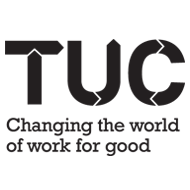
The labour movement has long been a shaper of technology and innovation. Connected by Data is proud to have contributed to that tradition as a special advisor to the Trades Union Congress’s groundbreaking AI and Employment Bill initiative.
Wales has been central to the UK labour movement, and now unions in Wales and TUC Cymru are grappling with how to shape AI. Connected by Data has been working in partnership with TUC Cymru on a series of initiatives, ranging from research on how workers in Wales are experiencing and engaging with AI and developing training materials. Connected by Data has also been advising TUC Cymru as part of an AI reference group for trade union members of the Workforce Partnership Group, part of the Welsh government’s social partnership approach to working with unions.
Building on this, we’re delivering a project with TUC Cymru on how worker voice can be embedded into emerging processes and policy on procurement of data and AI systems in the public sector in Wales.
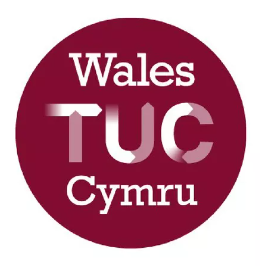

CONNECTED BY DATA collaborated with the TUC to develop a comprehensive strategic framework for building labour movement capacity on AI. With a focus on sectors, movement building and interventions through the AI value chain, this ambitious strategic approach charts a path for the TUC to ensure the technology is in the service of workers.
The Communications Union (CWU)
Building worker power on AI in telecoms, tech and financial services with the CWU
We’re collaborating with the Communications Workers Union (CWU) to develop the practical skills needed to identify and negotiate the impact of AI on workers in the telecoms, tech and financial services sectors.
Through a series of action-oriented workshops over 5 months, union reps and officers will dig into the concepts and tools of building worker power on data and AI and apply learning in workplaces. We will work towards collective agreements, lasting partnerships between CWU, civil society, and academic allies and the bolstering of the union’s political advocacy on technology.


The official push to roll out AI in education (among every other area…) throws up sticky questions of pedagogy, practicality and professionalism. Yet too often the voices of educators – support staff, teachers, school leaders and specialists – are squeezed out by the promises of Edtech products offering to solve everything from attainment to attendance.
Artificial intelligence (AI) and digital technologies are rapidly evolving and complex issues that have wide-ranging implications across sectors and workplaces. While there are overarching concerns, union and policy responses are more effective when tailored to reflect the specific contexts of different industries, technology applications, impact on workers, regulatory regimes and ethical concerns.


Across industries, companies are seeking to exploit content generated by their workers past and present to create customised generative AI. The same pattern is appearing across journalism, education, creative industries, the legal profession, public sector, research and consultancy: wherever people write documents, the organisations that own the rights to that text – often their employers – are aiming to reuse it to build or customise AI language models.

As AI is increasingly rolled out in the workplace, a key need is for effective training and learning for trade unionists to shape, resist or use AI and related digital technologies.
In particular, as found in the Wales TUC and Connected by Data report ‘A snapshot of workers in Wales’ understanding and experience of AI’, trade union training and education on AI should be tailored to the needs and experience of workers. This includes introductory, sector and technology specific materials and training on how AI and digital intersect with familiar means of negotiation, for example equalities, health and safety, pay and conditions.
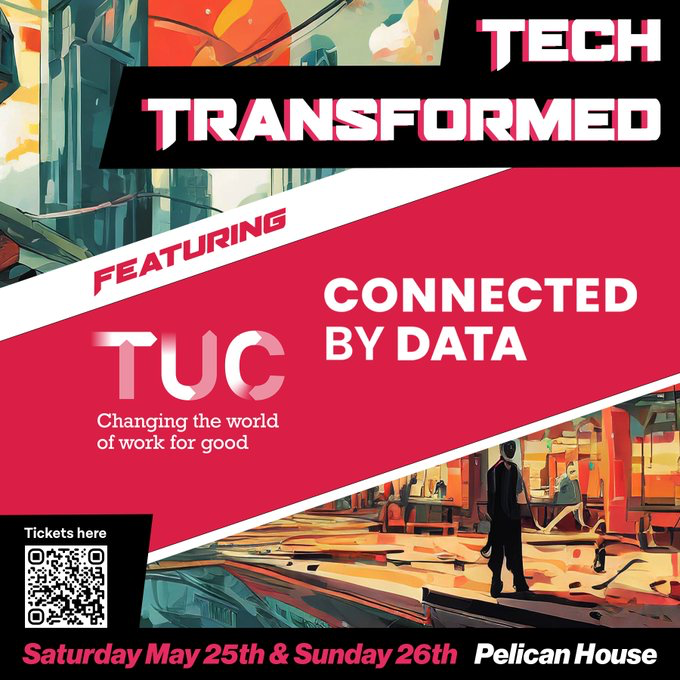
Adam will be supporting one of the sessions at CADA’s Tech Transformed festival. Adam will be speaking alongside Mary from TUC on on how the labour movement must adapt to meet the challenges of our new digital era.

Adam spoke on panel at the Wales TUC Annual Congress focusing on how trade unions are engaging with digitalisation and AI. Hosted by law firm Watkins and Gunn, Adam appeared alongside Tom Hoyle, President-elect of Wales TUC, Chloe Rees organising and development officer at Wales TUC and John James of the Bakers, Food and Allied Workers Union.
At the Congress, a motion was passed on AI citing the Wales TUC and Connected by Data report ‘A snapshot of workers in Wales’ understanding and experience of AI’.

With the use of AI and data driven tools increasing in the civil service and by public servants, Adam spoke on a panel at the annual conference of the FDA, the union representing public service managers and professionals.
Appearing alongside a colleague from the TUC and in conversation with the FDA’s General Secretary, Adam discussed Connected by Data’s work with TUC Cymru and the implications of the Data Protection and Digital Information Bill for public service workers.

Not a day goes by where data and AI isn’t in the news. Yet the most prominent voices tend to be tech CEOs, often overly focused on remote and extreme threats.


Wales TUC are looking into how AI is affecting workers across different sectors, and how trade unionists are managing the increasing roll out of data-driven technologies
Wales TUC - supported by Dr Juan Grigera from Kings College London and Adam Cantwell-Corn from Connected by Data - are investigating how workers in a range of sectors are responding to digitalisation and AI at work. This write up is intended to capture the key comments by the workers, which will later inform a full report.
Artificial intelligence is having a dehumanising effect on workers as they are continuously monitored. What’s more, it’s leading to workers being deskilled, their tasks restructured and sometimes managed out of their jobs.

New technology is being forced on workers without consent. But trade union members are determined to resist the negative aspects of artificial intelligence.
Wales TUC are looking into how AI is affecting workers across different sectors, and how trade unionists are managing the increasing roll out of data-driven technologies.
Wales TUC - supported by Dr Juan Grigera from Kings College London and Adam Cantwell-Corn from Connected by Data - are investigating how workers in a range of sectors are responding to digitalisation and AI at work. This write up is from the second workshop in the project. The first write up is available here.

Amid the hype and worry about the data-driven transformation of our world, there is often something conspicuously missing: personal stories. They ground our understanding that this change is not a remote future, but is a reality in progress that is affecting every relationship and interaction we have, as workers, family members, consumers and as citizens.
In an effort to address this and build on these case studies, Connected by Data worked with Mary Towers of the TUC’s AI project and affiliate unions to support three workers with direct experience of AI to be in conversation with MPs. On the 20th June, in the grand setting of Committee Room 9 of the House of Commons, a packed audience of trade unionists, policy professionals, politicians and journalists heard first hand how AI is affecting workers in the here and now.

On 5th December 2022, CONNECTED BY DATA organised an event in parliament, hosted and chaired by Lord Tim Clement-Jones, to explore three key areas around the future of data governance: automated decision-making, data at work and data in schools.
These are all areas that could be affected by the Data Protection and Digital Information Bill, expected to return to parliament for its second reading at some point in 2023. We think the Bill represents an opportunity to influence how data is governed in a more democratic and participatory way, but worry that – in its present form – it undermines existing safeguards and misses the chance to extend democratic data governance.
The three areas under discussion also represent domains where growing data collection and use could have both significant benefits and harms in the future, regardless of what happens to the Bill. The event invited opening contributions from civil society and academic experts on each topic before opening up to a wider discussion. The experts were on the record unless they requested otherwise, with everyone else being unattributed under the Chatham House Rule.
Recent news
We were pleased to support the research and writing of the Wales’ TUC report entitled “A snapshot of workers in Wales’ understanding and experience of AI”.
Opinion
Addressing the complex issues surrounding AI at work can be challenging. It touches on personal experiences, professional roles, and charged political views on Big Tech. It often involves vague or technical terminology. It’s a topic that many employers will see as their ‘management prerogative’ and out of scope for collective bargaining or even worker consultation.
Connected by Data is proud to have contributed to the development of pioneering new standards on the use of AI to manage workers in Wales.
As part of the Trade Union Congress Cymru’s reference group on AI, Adam Cantwell-Corn fed into the development of guidance that sets high standards for the voice and rights of workers concerning use of AI in public sector bodies. The guidance was adopted formally by the Welsh Government in December 2024.

